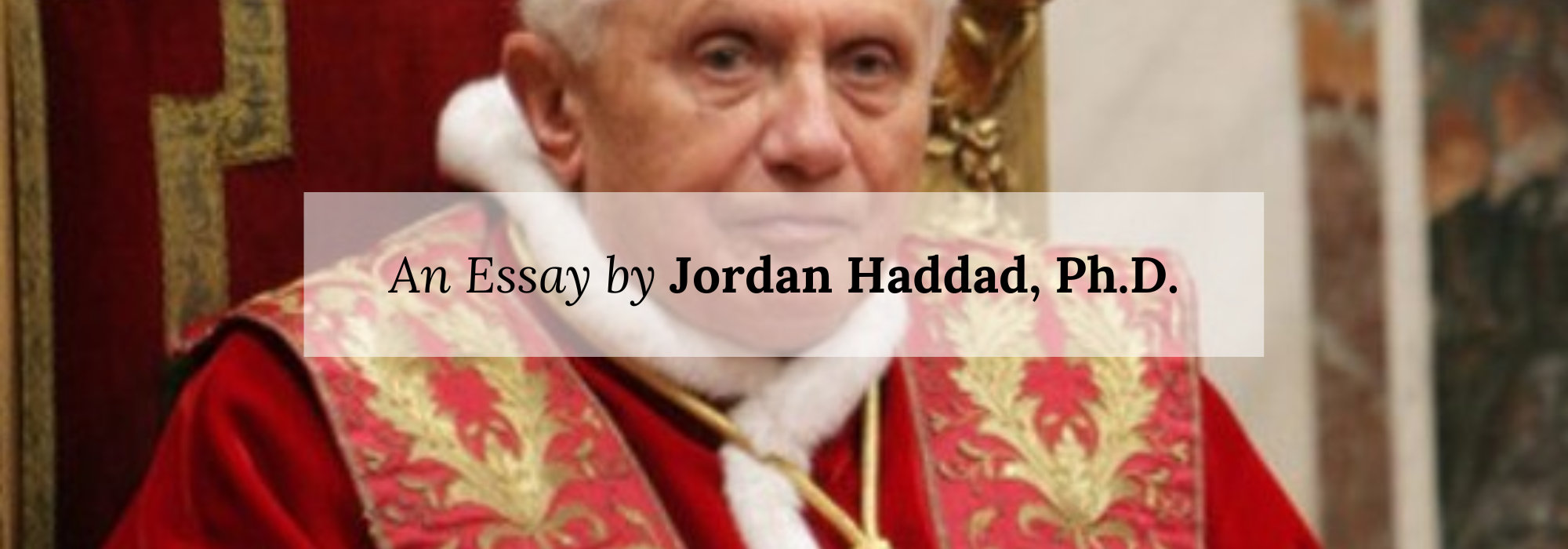Joseph Ratzinger: Servant of God
By Peter Nguyen - https://commons.wikimedia.org/wiki/File:Pope_Benedict_XVI_2.jpg, CC BY-SA 4.0, https://commons.wikimedia.org/w/index.php?curid=127503734
Joseph Aloisius Ratzinger (1927-2022), who would later become Pope Benedict XVI in April 2005, was many things. He was a lover of cats and fruit tea (with considerable amounts of sugar and lemon), a casual cyclist and badminton player in his younger years, a loyal child of Bavaria, a Mozart and Beethoven aficionado, and a Nazi defector in his youth after a forced conscription, for his family were vehemently anti-Nazi. He was the kind of man who kept a couch in his office so he could comfortably read and even take naps when the occasion allowed, as we are all inclined to do. When giving interviews to the German journalist Peter Seewald, he would sometimes position himself in his chair so that he could place one of his legs over its arm when he settled into the conversation, or just tug at his suspendors.
He was also, of course, an accomplished theologian and formidable churchman, a charitable ecumenist and interlocutor with secular philosophers, and a mild-mannered champion of Catholic doctrine and tradition. Above and beyond all of these, he was a lover of Jesus Christ, and his life’s mission was to keep the human mind and heart open to God, not simply for the wise and powerful of the world but for all, not just for the sake of understanding, but for living and loving.
As a child of a devout Catholic family in rural Bavaria, young Ratzinger was surrounded with the natural beauty of creation and the supernatural mysteries of the Christian faith, both of which impressed themselves deeply upon his mind and heart. Although possessing a prodigious intellect, he never succumbed to the wiles of rationalism, nor the allures of the brave new modern world. The reality of the simultaneously revealing and yet hidden God was a palpable force in his life, and Ratzinger knew him more as a person than mere idea or speculation. In the words of Seewald in Benedict XVI: An Intimate Portrait: “A servant, that was the impression I had. A person who was prepared to be taken into service. Animated by the reality of God. Here was someone for whom God’s irruption into the world through Jesus Christ is an absolute reality. He compared God with breath, with light, with food, and with friendship. ‘If God suddenly disappeared,’ he said, ‘my soul would not be able to breathe properly.’”
As a pastor and academic, Ratzinger was keenly aware of the presence of God, and the difference that God makes to human life. He thoroughly imbibed Christian wisdom, a vision of all things in light of God’s self-revelation in Christ, and he saw the task of theology and preaching as not simply an exploration of the Christian mysteries for its own sake but as a movement of love by virtue of which one can begin to see the world differently, or, better yet, truly. From human origins to the last things and everything in between, Christ was the center who holds all things together in his very self, “reconcil[ing] to himself all things, whether on earth or in heaven, making peace by the blood of his cross” (Col 1:20).
By focusing steadfastly on the incarnate Lord crucified, risen, and ascended, Ratzinger was above all a lover of the God who is love itself and, by extension, a lover of mankind, for the Son assumed to himself our human nature and in so doing united himself to each one of us in some real way. Love was the primary impetus behind his unrelenting denunciation of the dictatorship of relativism, which would eschew the very concept of God and debase the human person in the process, as well as his acquiescence to serve as Prefect for the Congregation of the Doctrine of the Faith under John Paul II and later as his successor to the papacy, both of which meant the relinquishment of a promising academic career. In all of this, he worked tirelessly to remind the world of God and to re-present the Christian message anew to a Western civilization that had lost contact with the Gospel. Like his predecessor before him, Ratzinger saw the urgent need for a re-evangelization of a world fallen asleep in the darkness of sin and the apathy of modern life.
In so doing, Ratzinger spoke time and again of the need to cultivate an account of human reason and experience as intrinsically open to the reality of God, as the one who is simultaneously “more inward to me than my most inward part,” as Augustine says in Book III of the Confessions, whose existence shines forth in the resplendence of creation, and who addresses us person to person through his self-revelation. As Ratzinger saw it, human reason and experience are vehicles for an encounter with the person of Jesus Christ, and this encounter should transform not only our personal lives but also the Church and society through the cultivation of a culture grounded in the Paschal Mystery.
With the death of Joseph Ratzinger, the Church and the world have suffered a great loss, for – despite his shortcomings and mistakes – he was a shining light who reflected to all who had the ears to hear and eyes to see the glorious mysteries of God through his humble witness and formidable mind. And yet with his passing, the Church and world have gained much, for he remained a witness and shepherd to the end, urging the Church in his spiritual testament to “Stand firm in the faith! Do not be confused!”, and now he – God willing – will enter even more deeply into the heart of the Church, which is Christ, and thereby accompany us until the end of the age.
Jordan Haddad, Ph.D., is a Professor of Dogmatic Theology at Notre Dame Seminary and President of The St. Louis IX Art Society.


